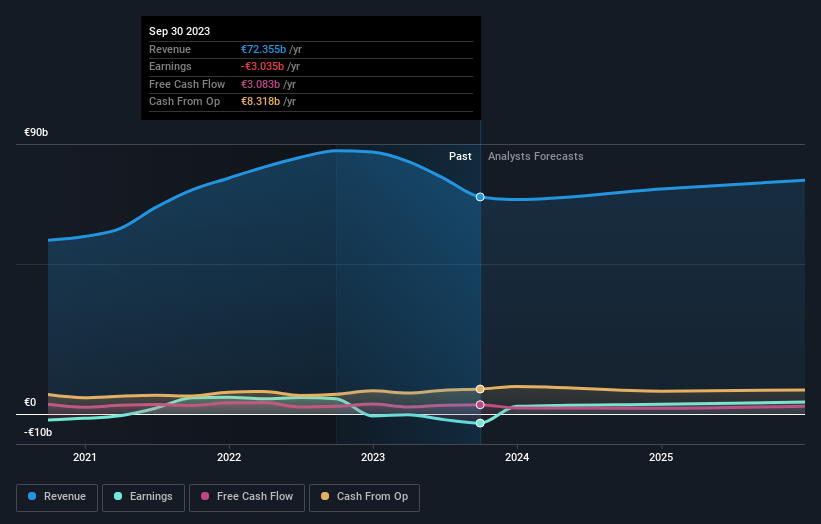Earnings Miss: BASF SE Missed EPS By 20% And Analysts Are Revising Their Forecasts

It's shaping up to be a tough period for BASF SE (ETR:BAS), which a week ago released some disappointing quarterly results that could have a notable impact on how the market views the stock. It looks like quite a negative result overall, with both revenues and earnings falling well short of analyst predictions. Revenues of €16b missed by 10%, and statutory earnings per share of €0.28 fell short of forecasts by 20%. The analysts typically update their forecasts at each earnings report, and we can judge from their estimates whether their view of the company has changed or if there are any new concerns to be aware of. We've gathered the most recent statutory forecasts to see whether the analysts have changed their earnings models, following these results.
View our latest analysis for BASF

Taking into account the latest results, the current consensus from BASF's 20 analysts is for revenues of €75.0b in 2024. This would reflect a satisfactory 3.7% increase on its revenue over the past 12 months. Earnings are expected to improve, with BASF forecast to report a statutory profit of €3.78 per share. Before this earnings report, the analysts had been forecasting revenues of €75.7b and earnings per share (EPS) of €3.92 in 2024. So it looks like there's been a small decline in overall sentiment after the recent results - there's been no major change to revenue estimates, but the analysts did make a small dip in their earnings per share forecasts.
The consensus price target held steady at €49.40, with the analysts seemingly voting that their lower forecast earnings are not expected to lead to a lower stock price in the foreseeable future. That's not the only conclusion we can draw from this data however, as some investors also like to consider the spread in estimates when evaluating analyst price targets. There are some variant perceptions on BASF, with the most bullish analyst valuing it at €62.00 and the most bearish at €37.00 per share. This shows there is still a bit of diversity in estimates, but analysts don't appear to be totally split on the stock as though it might be a success or failure situation.
Another way we can view these estimates is in the context of the bigger picture, such as how the forecasts stack up against past performance, and whether forecasts are more or less bullish relative to other companies in the industry. It's pretty clear that there is an expectation that BASF's revenue growth will slow down substantially, with revenues to the end of 2024 expected to display 2.9% growth on an annualised basis. This is compared to a historical growth rate of 8.7% over the past five years. Juxtapose this against the other companies in the industry with analyst coverage, which are forecast to grow their revenues (in aggregate) 3.1% annually. So it's pretty clear that, while BASF's revenue growth is expected to slow, it's expected to grow roughly in line with the industry.
The Bottom Line
The biggest concern is that the analysts reduced their earnings per share estimates, suggesting business headwinds could lay ahead for BASF. They also reconfirmed their revenue estimates, with the company predicted to grow at about the same rate as the wider industry. There was no real change to the consensus price target, suggesting that the intrinsic value of the business has not undergone any major changes with the latest estimates.
With that in mind, we wouldn't be too quick to come to a conclusion on BASF. Long-term earnings power is much more important than next year's profits. We have forecasts for BASF going out to 2025, and you can see them free on our platform here.
You should always think about risks though. Case in point, we've spotted 2 warning signs for BASF you should be aware of, and 1 of them is a bit concerning.
Valuation is complex, but we're here to simplify it.
Discover if BASF might be undervalued or overvalued with our detailed analysis, featuring fair value estimates, potential risks, dividends, insider trades, and its financial condition.
Access Free AnalysisHave feedback on this article? Concerned about the content? Get in touch with us directly. Alternatively, email editorial-team (at) simplywallst.com.
This article by Simply Wall St is general in nature. We provide commentary based on historical data and analyst forecasts only using an unbiased methodology and our articles are not intended to be financial advice. It does not constitute a recommendation to buy or sell any stock, and does not take account of your objectives, or your financial situation. We aim to bring you long-term focused analysis driven by fundamental data. Note that our analysis may not factor in the latest price-sensitive company announcements or qualitative material. Simply Wall St has no position in any stocks mentioned.
About XTRA:BAS
Adequate balance sheet and fair value.
Similar Companies
Market Insights
Community Narratives



